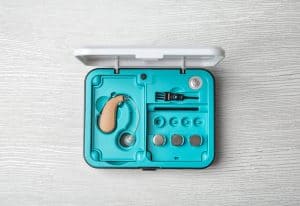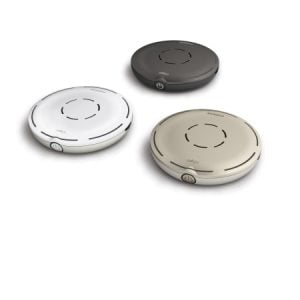
The prevalence of hearing loss increases with age. However, even though many older adults over the age of 65 would benefit from a hearing aid, most do not use one for a variety of reasons, ranging from pride to cost. If you are wondering how to choose a hearing aid for yourself or for your aging loved one who is struggling with hearing loss, there are a variety of factors to consider in order to make the best decision possible. We suggest factoring in hearing aid costs along with your medical alert Life Alert cost when budgeting for your aging loved one.
The Importance of Hearing Aids
Using a hearing aid can benefit older adults in multiple ways. Not only does a hearing aid allow them to feel more confident in social situations or during conversations, but properly working hearing aids have also been tied to decreased behaviors in older adults living with dementia and even in decreasing falls at home. Hearing aids can lead to decreased feelings of loneliness or isolation, as well as increased cognitive functioning.
With so many benefits of using a hearing aid, why don’t most seniors choose to use them? It’s complicated, but studies have shown that seniors can feel embarrassed using the device, find the device difficult to use and maintain, or simply find the device to be too expensive for their fixed budget.
How to Choose a Hearing Aid
Before you or your loved one can choose a hearing aid, you must first make an appointment with a physician to talk about your hearing concerns. Your geriatrician will perform simple tests to ensure your hearing loss is not associated with a treatable condition or concern, and will likely then make a referral to an experienced audiologist.
Your audiologist will first determine your hearing loss and can then recommend hearing aid styles that will best suit your loss and your lifestyle. Unfortunately, audiologist services are not always covered by third party insurance. Don’t let this stop you. Instead, inquire about financial programs through your city, township, or Veterans services that could potentially decrease the cost of audiology visits or hearing aid costs.
Types of Hearing Aids

A hearing aid case is well worth the investment, as it keeps your aid and accessories protected when not in use.
There are multiple types of hearing aids that you can choose from in order to receive the best outcome and fit. It will take some time to get used to your hearing aid’s fit and function, but the effort will be well worth it when you can participate in the conversations around you. Some hearing aid manufacturers and audiologists offer a trial period so that you can get used to the device and decide if it is the best decision for your lifestyle and situation. Inquire about this during your appointment.
Generally speaking, there are three main categories of hearing aids: in the ear (ITE), behind the ear (BTE), and canal aids. The canal aids category has two types of aids: in the canal (ITC) and completely in canal (CIC).
In the ear, or ITE, hearing aids fit inside the inner ear. The aids are specially molded to fit your ear. Seniors with mild to severe hearing loss can benefit from these types of hearing aids. These devices sometimes have more options than other aids, including volume control and longer battery life.
Behind the ear, or BTE, hearing aids include a hard plastic device that sits behind the ear. This is connected via a plastic tube to a softer piece called an earmold that sits in the outer ear. It can be cumbersome for some users to have this larger connected piece, but the BTE option is quite helpful for seniors who have issues with consistent ear wax buildup.
Finally, in the canal and completely in canal aids are devices that are used in the ear canal, making them nearly invisible from the outside. These aids are good options for seniors who have mild to moderate hearing loss.
Hearing Aid Accessories

Accessories like microphones can help ensure you never miss a conversation. Image Credit: Phonak
When you purchase a hearing aid, there are some accessories that you will need as well. The first is the hearing aid battery. Unfortunately, many seniors can neglect regularly changing their hearing aid battery which can lead to frustration and confusion during conversations or daily interactions. Most hearing aid batteries are affordable; consider purchasing a few to have on hand in designated spots in the home or in the car. If changing batteries sounds like a cumbersome task, talk to your audiologist about recommending a hearing aid that features a rechargeable battery, as this is an option on some devices.
Clip-on microphones, like those from Phonak, can further help seniors hear in loud environments. Other microphones, like those from Beltone, can link to the television or your smartphone to ensure you don’t miss a word of your favorite show or conversation. You should also invest in a case that will keep your hearing aids safe and dry when you are not using them; try any case from a company like Hearing Direct that would suit your current lifestyle or needs.
Choosing the right hearing aid can feel overwhelming at first. However, your physician and audiologist can narrow down your choices based on your preferences and challenges. Then, you can make a decision on a device that you will use for years to come.


